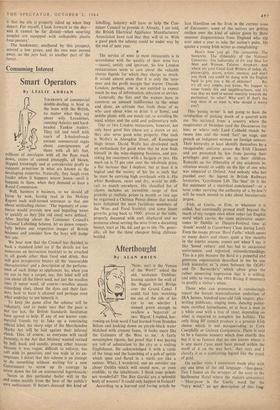Another Part of the Forest
Mark Over
By STRIX THERE is no close season for claptrap, as there is for pheasants; but as we flock to the hustings the tosh- words, flushed by armies of beaters in the constitu- encies and the party head- quarters, are noticeably more plentiful and stronger on the wing than at any other time.
To most of these tosh- words—like `dynamic,' meaningfur and 'stream- lined'—only a pedant could take serious objec- tion; after all, the poor brutes have got to say something. The only one I jib at is any use of the verb 'to plan.' Two assumptions appear to underly its employment. One is that all planning is a good thing; the other is that the alternative to planning is laissez-faire and, by corollary, that it is possible to conduct public or for that matter private affairs without planning. Any oaf can see that both these assumptions are false.
Leaving the pre-natal imponderables of Family Planning out of it, every single one of us has been involved in plans of one kind or another from the moment of birth. Eventually we started making plans for ourselves (these often clashed with those made for us by our parents); then, as likely as not, we started, with a partner, making plans for married life; and before we knew where we were we were back where we came in, making plans for small, pink angry human beings about as long as a cat. Some of these plans were sound, had luck,.and worked out well; some were bad, or unlucky. These failed. • Meanwhile, over our heads, successive Govern- ments were making plans for us, or (more fre- quently) amending plans which had been made for our forefathers. Occasionally our rulers pioneered new fields of planning, generally in the teeth of a storm of protest; the National Health Service and Independent Television (look up those leaders in The Times) are two examples that come to mind. But it is not necessary to evoke that battered Aunt Sally, the Groundnuts Scheme (which as far as I can remember aroused in a hungry nation no controversy when it was launched), to remind you that, while some plans are good plans and may with luck succeed, others are bad plans and will, however favourable the circumstances, come at the very best to naught.
We live amid the ruins of plans: some sound but, like the canals, slowly overtaken by the march of events: others momentarily specious, like the Thor missile bases, but obsolete before they were implemented: others again, though deeply pondered, clearly wrong from the first, like the glut of hideous buildings providing office accommodation in London, whence the planners are now strenuously urging offices .to remove themselves.
The Allied plans for Passchendaele, the German plans for Stalingrad, occupied hundreds of staff officers and covered reams of paper: at Waterloo and Trafalgar the victors' planning was hardly more elaborate than if both had been masters of foxhounds on a good scenting day. You can't have a picture that isn't painted, and you can't have an administrative policy that isn't planned; but there are a great many more bad pictures than good ones, and politicians who use the epithet 'planned' as if it were a kind of halo should remember that it has often turned out to be a dunce's cap.
Par Exemple I planned to write something about 'planning' which would put the whole matter in perspective. Look what happened.
The Beatle-Loud Glade The lovely late September sun shone down through the beech-trees upon the clearing. Seated on collapsible chairs around their plastic dining- table under the lee of an expensive car, the happy trespassers were tucking in. As though from- some minstrel's gallery, Radio Caroline provided a strenuous accompaniment. Led by the jays, those strident but reliable scandalmongers, wild life had withdrawn from the environs.
Viewing this fete champetre from a distance, the bestial landowner snorted. 'It really is the limit,' he said, 'when they bring their furniture.' His younger companion, another member of the same vile class, disagreed. 'I admit it gives them a proprietorial air, and I can see that you find that distasteful,' he said. 'But I'm in favour of these elaborate mises en scene. The tables and chairs provide comfort, the radio acts as an anchor and the beech seedlings don't get flattened under rugs; there is no incentive to wander far afield, and consequently less risk of gates being left open, fires started or game disturbed. More- over the aura of domesticity is so strong that the ladies of the party, half persuaded that they are back in Mon Repos, will as likely as not see to
it that the site is properly tidied up when they depart. For myself, I look forward to the day— and it cannot be far distant—when courting couples are equipped with collapsible plastic four-posters.'
The landowner, unallured by this prospect, uttered a low groan, and the two men moved away, as the jays had, to another part of the forest.















































 Previous page
Previous page